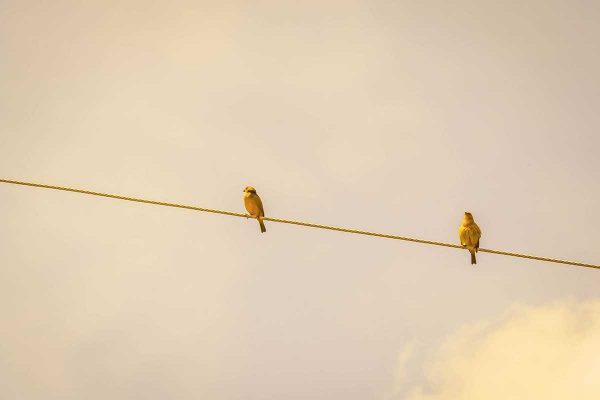
Every year, millions of people grab a pencil and paper to write down their top resolutions for the new year. Most of them say the same thing over and over again: quit smoking, hit the gym, read more books, spend more time with family and friends. But this year, what if we add taking care of the planet to these goals?
Scientists have made it clear: the next few years will be critical in achieving decarbonization and the goals of the Paris Agreement. They also will be necessary for ending the biodiversity crisis, reducing pollution, and changing consumption habits.
While many of the solutions fall in the hands of governments and companies, the truth is that we citizens can also do a lot to reduce our impact on the environment and have a more sustainable world. We’re suggesting seven good resolutions for 2022.
Being well-informed
 Knowing the reality of the environment is essential in making decisions. Kelly Sikkema (Unsplash)
Knowing the reality of the environment is essential in making decisions. Kelly Sikkema (Unsplash)
Staying informed is essential to changing habits. The environment and our planet’s health are tied to every aspect of our lives, and knowing about them in detail will help us make good decisions.
However, in the age of information overload and fake news, being well informed is not always easy. Here are a few solutions to stay up to date on climate change and the environment in 2022:
- Planeta Mauna Loa: a free weekly newsletter that looks at current environmental issues. This is a good option for those who don’t have time to read the newspaper.
- HOPE, en pie por el planeta (standing up for the planet): this project relays scientific information on climate change to the public through videos that almost always end up going viral.
- CLIMABAR: this project seeks to bring the climate emergency closer to home through social media with its upbeat, fun tone.
Another good idea is talking about our planet’s problems, and the more, the better. According to a Kantar survey, when it comes to the environment and sustainable habits, we particularly pay attention to what our friends and family have to say.
Smarter shopping
Our consumption has a significant footprint on the planet. Therefore, one good idea for this new year is to do better at choosing what we buy: try to make local purchases that are produced in ethical conditions with lasting materials and whose design will allow us to use them for a long time.
In other words, steer clear of waste, impulse buys, deceptive offers, and lack of reflection. Here are some ideas to do this:
- The Goood Shop: a marketplace with sustainable fashion, accessories, and decoration where the stories of the people who create the products are also told.
- So Good So Cute: a magazine that shares ideas on sustainable fashion, design, and food (among other things) to “inspire you to experience sustainability as something fun, fresh, and positive.”
Taking a stand against unnecessary waste
 Reusable packaging is a good first step in reducing waste. Markus Spiske (Unsplash)
Reusable packaging is a good first step in reducing waste. Markus Spiske (Unsplash)
For years, we’ve seen alarming figures on plastic waste and its impact on the environment. More than 11 million metric tons of this waste ends up in the oceans each year, and it’s estimated that this figure may triple over the next two decades.
The problem doesn’t stop there: a recent study by the United Nations Food and Agriculture Organization (FAO) shows that the land used for agriculture has even higher amounts of plastic waste than the oceans.
What can we do to stop this trend? Honestly, reducing garbage quantities is much easier than it seems. Just pay attention to the 3 Rs: Reduce, Reuse, and Recycle, with particular emphasis on reducing. In case you don’t know where to start, here are some ways to go without plastic (and many other unnecessary materials and objects):
- Vivir sin plástico (Living Without Plastic): this is a podcast, blog, and book that looks at the problems around this material and offers advice on reducing the use of disposable plastics.
- Esturirafi: this started out as a blog, and now it has a store where you can get sustainable, reusable products that are plastic-free.
Rethinking what you eat
One of the most effective ways to reduce our carbon footprint is to eat more plant products. This advice, which is increasingly heard from scientists and politicians, has given rise to much controversy. The truth is, you don’t have to stop consuming meat to have a positive impact; just reduce the amount you eat or don’t have it every day.
Preventing food waste, consuming less processed foods, and committing to local and seasonal foods are other keys to having a more sustainable diet. These are, therefore, some other good resolutions for 2022.
Turning around energy consumption
 Using energy-saving light bulbs is one way to reduce energy consumption. Ruthson Zimmerman (Unsplash)
Using energy-saving light bulbs is one way to reduce energy consumption. Ruthson Zimmerman (Unsplash)
Another resolution for a more sustainable new year is reducing our energy usage. This could look like saving water (installing saving systems in our homes or reducing the time we spend in the shower, for instance) or being more conscientious about using lights (changing out bulbs for low-consumption replacements, turning them off whenever they’re not needed, and preventing phantom loads).
Another option is to turn to renewable energy sources. There are different ways to do so – everything from installing solar panels to simply changing utility companies for one that uses renewable sources.
Commit to cleaner transportation
Riding your bike, walking, using public transit, and leaving your car parked more on a daily basis reduces greenhouse gas emissions and other pollutants that worsen our health and the planet’s.
Here are a few of the many ways to calculate the carbon footprint of our trips and to find options to reduce it:
- Carbon Footprint Calculator: this calculator shows you the carbon footprint of each trip and lets you compare it with a route using other vehicles.
- The Fundación Vida Sostenible Calculator: another option for calculating a carbon footprint that also accounts for your home and habits.
Spending more time in nature
 Changing how you spend leisure time will help you adopt more sustainable habits. Ronaldo de Oliveira (Unsplash)
Changing how you spend leisure time will help you adopt more sustainable habits. Ronaldo de Oliveira (Unsplash)
This resolution can help achieve all of the above: by spending less leisure time on consumer activities and more of it in nature, our needs are reduced, and we can find just as much happiness (or even more) with much less





There are no comments yet